Founded in 1984, Brazil’s Movimento dos Trabalhadores Rurais Sem Terra (MST), or Landless Workers’ Movement, unites about 1.5 million members who seize unused land to live and farm on.[1] The MST currently has about 900 encampments where 150,000 families reside.[2] Researchers say MST’s occupied lands comprise an area larger than Italy. The MST is committed to Indigenous sovereignty and does not occupy lands claimde by Indigenous peoples.[3]
Culture
MST meetings always begin with a mistica,[6] which is described as “the morale-boosting, quasi-religious communal ceremony at the heart of the MST culture, involving songs and chants.”[7]
The movement puts enormous emphasis on education. They run schools influenced by the ideas of Paulo Freire. Each adult member spends two months studying each year. A member who is illiterate must study how to read, and a member who finished college must attend graduate school.[8]
Freire himself strongly supported the MST and approvingly recounted how he once heard a a MST speaker say, “[T]he more ignorant we were, and the more innocent we were of the ways of the world, the better it was for the landowners, and the more knowledgeable we got, the more frightened the landowners became.”[9]
The MST is committed to social justice and diversity. The Gender Sector strives to implement the movement’s goal of gender equality, for example by ensuring that women have 50% representation in spokesperson positions whenever possible.[10] According to Rafael Forsetto, the movement welcomes “Black, Indigenous, quilombolas (Afro-Brazilians), and LGBTQ+ farmers, as well as those in both rural and urban areas.”[11]
Decisions
Each group of 10 families forms a base nucleus which meets at least once a week to make decisions. Emphasis is placed on keeping remarks brief. The assembly strives to make decisions by consensus.[12] MST tries to make as many decisions at possible at the base-nucleus rather than at higher levels.[13]
The base nucleus elects a man and a woman to its settlement council, and that settlement elects a man and a woman to the regional council. The regional council then sends a pair to the province council, which sends a pair to the national council. At a 2007 national council meeting, there were 17,000 participants organized into nuclei of about 50 people each.[14]
Economy
The MST are committed to replacing capitalism with a system where: “All production will be developed with the control of workers over the result of their work. The social relations of production must abolish exploitation, oppression, and alienation.”[15]
The MST settlements establish sustainable farms, schools, and credit unions.[16] As an example, the 7,500-acre Contestado encampment has “a town square, a farmers’ cooperative, a health clinic, schools, markets, and even a cultural center.”[17]
MST settlements vary in economic structure, with some farming communally and others parceling out land to individual families. According to Peter Gelderloos, the communal farmers, notably Comunas da Terra, obtain a higher standard of living.[18]
Environment
The MST’s 2014 Agrarian Program emphasized environmental sustainability and reforestation. Here is the section on “Natural Resources”:
“Water and native forests are assets of the natural world and they should be treated as a right of all workers. They cannot be treated as commodities and must not be subject to private appropriation.
a) Ensure that the waters and forests are preserved as a public good, accessible to all.
b) Combat deforestation and illegal logging and illegal trade
c) Reforest the degraded areas with ample biodiversity of native and fruit trees, ensuring environmental preservation.”[19]
The MST opposes most pesticide use, and one of the national spokespeople says “The MST defines agroecology as its main productive method.” The Contestado community is one of several in the process of fully transitioning to agroecology.[20]
Source: Anarchy in Action
